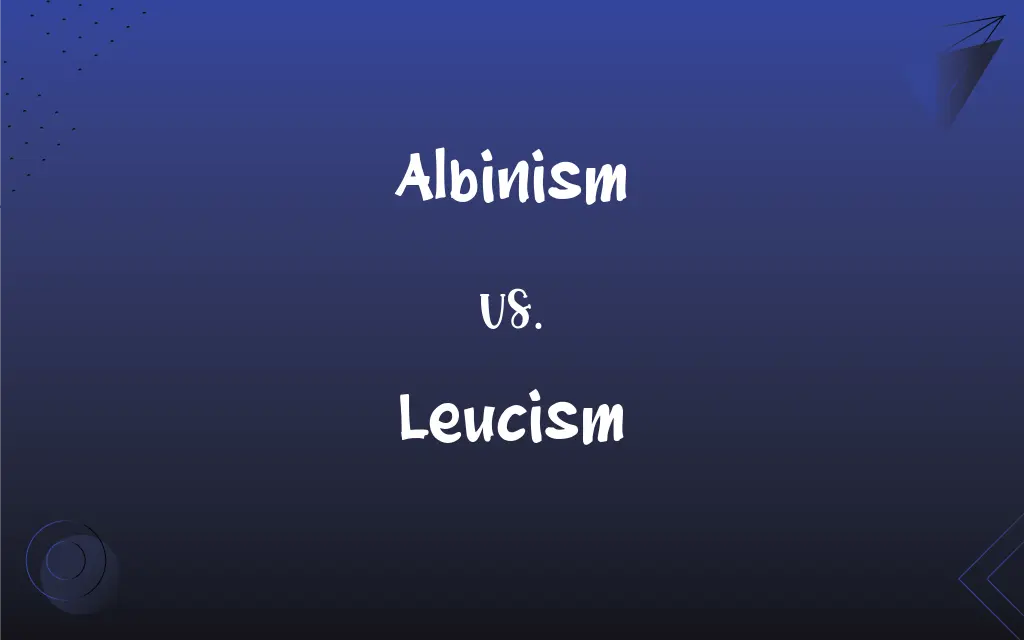Albinism vs. Leucism: What's the Difference?
Edited by Aimie Carlson || By Janet White || Published on March 2, 2024
Albinism is a genetic condition causing a lack of melanin, resulting in white skin and hair, and often red eyes. Leucism is a partial loss of pigmentation, leading to white, pale, or patchy coloration in animals but not affecting the eyes.

Key Differences
Albinism is characterized by a total absence of melanin, affecting skin, hair, and eye color. Leucism results in reduced pigmentation, but it does not affect eye color, which remains normal.
Albinism is caused by a genetic mutation affecting melanin production. Leucism is also genetic but usually results in partial loss of pigmentation, not a complete absence.
Individuals with albinism often have vision problems due to the lack of pigment in the eyes. Leucism, however, does not typically affect vision.
Albinism can be found in both humans and animals, presenting a characteristic pale appearance. Leucism occurs in animals, leading to white or patchy coloration in fur, feathers, or scales.
Albinism leads to a uniform lack of color across the entire body. Leucism may result in partial or fully white coloration, often with patches of normal color.
ADVERTISEMENT
Comparison Chart
Pigmentation Effect
Complete absence of melanin
Partial loss of pigmentation
Eye Color
Often red or very light
Normal eye color
Genetic Cause
Mutation affecting melanin production
Genetic but does not eliminate melanin entirely
Affects Vision
Often causes vision problems
Usually does not affect vision
Common in
Both humans and animals
Mostly seen in animals
ADVERTISEMENT
Albinism and Leucism Definitions
Albinism
A condition affecting melanin production.
Albinism is visible from birth in humans and animals.
Leucism
Causes pale or patchy coloration in animals.
A bird with leucism had mostly white feathers with some colored spots.
Albinism
A genetic condition leading to pale skin and hair.
People with albinism often need protection from the sun.
Leucism
Reduced pigmentation leading to white or light color.
Leucism in lions results in a paler mane and coat.
Albinism
Characterized by a lack of skin and hair pigmentation.
Albinism in animals can make them more vulnerable in the wild.
Leucism
Does not completely eliminate melanin.
Leucism caused the snake to have a lighter, but not completely white, coloring.
Albinism
Absence of melanin in skin, hair, and eyes.
The albino rabbit had pure white fur and red eyes.
Leucism
Genetic condition affecting skin or feather color.
The leopard exhibited leucism with its unusually light spots.
Albinism
Leads to white or very pale coloration.
Albinism caused the bird to have completely white feathers.
Leucism
Partial loss of pigmentation, not affecting eyes.
The deer with leucism had patches of white in its coat.
Albinism
Any of several inherited conditions characterized by the reduction or absence of the pigment melanin in a person or animal, resulting in lack of pigmentation in the eyes, skin, and hair. Humans with albinism usually have vision problems.
Leucism
A partial loss of pigmentation in a human or other animal, resulting in white, pale, or patchy coloration of the skin, hair, fur, or feathers but not the eyes.
Albinism
Lack of chlorophyll in a plant or plant part, resulting in a pale color.
Leucism
An animal condition in which there is partial loss of pigmentation resulting in white, pale, or patchy coloration of the skin, hair, feathers, scales or cuticle, but not the eyes (caused by a reduction in multiple types of pigment, not just melanin).
Albinism
Congenital lack of melanin pigmentation in the skin, eyes, and hair or feathers (or more rarely only in the eyes); the condition of being albino.
Albinism
The state or condition of being an albino: abinoism; leucopathy.
Albinism
The congenital absence of pigmentation in the eyes and skin and hair
FAQs
What is albinism?
A genetic condition causing lack of melanin.
What is leucism?
A partial loss of pigmentation in animals.
Are albinism and leucism curable?
No, they are both genetic conditions.
Can albinism affect humans?
Yes, it affects both humans and animals.
Does leucism affect eye color?
No, eye color remains normal.
What are the risks for albinos in the wild?
Increased visibility to predators and sun damage.
Does leucism lead to health issues?
Not usually, it primarily affects appearance.
What causes albinism?
Genetic mutations affecting melanin production.
Is leucism found in humans?
It's primarily seen in animals.
Does albinism affect all races and species?
Yes, it can affect any race and many species.
Do people with albinism have vision problems?
Often, due to lack of pigmentation in the eyes.
Can leucism be partial?
Yes, it often results in patchy coloration.
Can leucism be seen in birds?
Yes, it's quite common in birds.
Is sunscreen important for people with albinism?
Yes, due to increased sensitivity to sunlight.
How is leucism caused?
By genetics, but it doesn't completely eliminate melanin.
Can animals have albinism?
Yes, many animals can be albino.
How is albinism diagnosed?
Through genetic testing and physical examination.
Are there different types of albinism?
Yes, there are several types based on genetic variations.
Is leucism the same as albinism?
No, they are different in terms of pigmentation loss.
Do animals with leucism have a normal lifespan?
Generally, yes, their lifespan is not affected.
About Author
Written by
Janet WhiteJanet White has been an esteemed writer and blogger for Difference Wiki. Holding a Master's degree in Science and Medical Journalism from the prestigious Boston University, she has consistently demonstrated her expertise and passion for her field. When she's not immersed in her work, Janet relishes her time exercising, delving into a good book, and cherishing moments with friends and family.
Edited by
Aimie CarlsonAimie Carlson, holding a master's degree in English literature, is a fervent English language enthusiast. She lends her writing talents to Difference Wiki, a prominent website that specializes in comparisons, offering readers insightful analyses that both captivate and inform.







































































